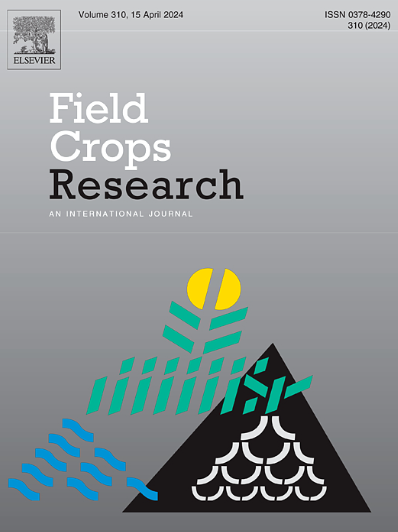Long-term plastic film mulching increased maize yield and water use efficiency
IF 6.4
1区 农林科学
Q1 AGRONOMY
引用次数: 0
Abstract
Context
The Loess Plateau plays an important role in ensuring food security in China. In the past few decades, the plastic film mulching (PFM) system has been widely used in the Loess Plateau, but whether PFM technology can maintain the stability of yield and the sustainability of soil water in the Loess Plateau remains uncertain.
Objective
To clarify whether PFM technology can maintain yield stability and soil water sustainability in the Loess Plateau, and reveal the effects of PFM on water use, yield, and regional water balance.
Methods
Using a 12-year field experiment (2012–2023), meta-analysis, and data-driven modeling, we demonstrated the following.
Results and conclusions
(1) In the Loess Plateau, compared to the CK treatment, PFM and film mulching with nutrient management (PFM+N) significantly improved both water use efficiency (WUE; +28 %, +31 %, respectively) and yield (+21 %, +33 %) in maize, and PFM+N synergistically enhanced yield stability (coefficient of variation 32.36 %) and sustainability (Sustainability Yield Index 0.5). (2) Future climate scenario simulations revealed that from 2021 to 2040, both CK and PFM treatments showed an increasing trend in the proportion of water-deficit areas across the Loess Plateau. However, PFM demonstrated critical compensatory advantages by improving precipitation use efficiency and optimizing annual soil moisture redistribution, effectively alleviating regional water imbalance. (3) Spatial analysis using data-driven models further indicated that PFM mitigated water deficits in the central, western, and northern regions (which have relatively low precipitation) through reduced evapotranspiration losses, whereas in southern areas characterized by relatively high precipitation, non-mulching practices proved more ecologically sustainable because excessive PFM use would disrupt natural hydrological cycles. while non-mulching practices proved more ecologically sustainable in southern areas where excessive PFM use could disrupt natural hydrological cycles.
Significance
Overall, the PFM system effectively alleviated the overall water consumption of the Loess Plateau, significantly increased WUE and maize yield, and, of great significance to sustainable development, the effect was best in low rainfall areas (Northwest of the Loess Plateau. Growing season precipitation: <250 mm; non-cropped precipitation:<200 mm). In the long run, PFM could effectively ensure water resource sustainability in the Loess Plateau, thereby laying a solid foundation for sustainable agricultural development in the region.
长期地膜覆盖提高了玉米产量和水分利用效率
黄土高原在保障中国粮食安全中发挥着重要作用。在过去的几十年里,地膜覆盖系统在黄土高原得到了广泛的应用,但地膜覆盖技术能否保持黄土高原的产量稳定和土壤水分的可持续性仍然是一个未知数。目的阐明PFM技术在黄土高原维持产量稳定和土壤水分可持续性方面的作用,揭示PFM对水分利用、产量和区域水分平衡的影响。方法通过12年(2012-2023年)的田间试验、荟萃分析和数据驱动建模,证明了以下几点:结果与结论(1)在黄土高原,与CK处理相比,PFM+N显著提高了土壤水分利用效率(WUE);分别为+28 %、+31 %)和产量(+21 %、+33 %),PFM+N协同提高了产量稳定性(变异系数32.36 %)和可持续性(可持续性产量指数0.5)。(2)未来气候情景模拟结果显示,2021 - 2040年,黄土高原CK和PFM处理的亏水面积比例均呈增加趋势。土壤水分补偿机制通过提高降水利用效率和优化年土壤水分再分配,有效缓解区域水分失衡,具有重要的补偿优势。(3)基于数据驱动模型的空间分析进一步表明,在降水相对较少的中部、西部和北部地区,PFM通过减少蒸散损失缓解了水分亏缺,而在降水相对较多的南部地区,由于过度使用PFM会破坏自然水循环,因此不覆盖的做法更具生态可持续性。而在过度使用PFM可能破坏自然水文循环的南部地区,不覆盖的做法被证明更具生态可持续性。总体而言,PFM系统有效缓解了黄土高原的总体耗水量,显著提高了水分利用效率和玉米产量,且在黄土高原西北部少雨地区效果最好,对可持续发展具有重要意义。生长季降水量:<;250 mm;水沉淀:& lt; 200 毫米)。从长远来看,PFM可以有效地保证黄土高原水资源的可持续性,从而为该地区农业的可持续发展奠定坚实的基础。
本文章由计算机程序翻译,如有差异,请以英文原文为准。
求助全文
约1分钟内获得全文
求助全文
来源期刊

Field Crops Research
农林科学-农艺学
CiteScore
9.60
自引率
12.10%
发文量
307
审稿时长
46 days
期刊介绍:
Field Crops Research is an international journal publishing scientific articles on:
√ experimental and modelling research at field, farm and landscape levels
on temperate and tropical crops and cropping systems,
with a focus on crop ecology and physiology, agronomy, and plant genetics and breeding.
 求助内容:
求助内容: 应助结果提醒方式:
应助结果提醒方式:


